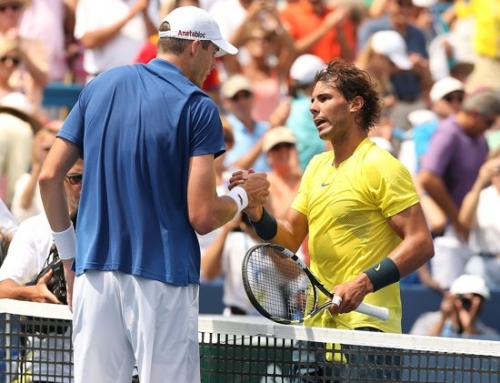 In a way, Tomas Berdych and Stan Wawrinka are similar. Both had some success when they were young. Berdych upset Roger Federer back in the 2004 Olympics when no one knew who Berdych was. Despite his talent, he struggled to make consistent results. 2010 was a huge year for him. There, he made a run to the French semis demolishing opponents along the way and pushing Soderling to 5 sets. Then, he followed that up with a Wimbledon final run, upsetting Roger Federer and Novak Djokovic to reach the finals. He was the one that finally stopped the Federer semifinal streak. 2011 was even more important because he won 50 matches for the first time in his career, and stayed in the top 10 for a second year in a row.
In a way, Tomas Berdych and Stan Wawrinka are similar. Both had some success when they were young. Berdych upset Roger Federer back in the 2004 Olympics when no one knew who Berdych was. Despite his talent, he struggled to make consistent results. 2010 was a huge year for him. There, he made a run to the French semis demolishing opponents along the way and pushing Soderling to 5 sets. Then, he followed that up with a Wimbledon final run, upsetting Roger Federer and Novak Djokovic to reach the finals. He was the one that finally stopped the Federer semifinal streak. 2011 was even more important because he won 50 matches for the first time in his career, and stayed in the top 10 for a second year in a row.
Wawrinka didn’t quite have the same highs as Berdych, but he reached the top ten back in 2008 by reaching the Rome finals losing to Djokovic. He would team with Roger Federer to win Olympic gold in doubles, upsetting the Bryan brothers en route.
Wawrinka has played good tennis, but 2012 seems to be a breakthrough year for him. He pushed Djokovic to 5 sets in the best match at the Australian Open, and some might contend the best match this year. Wawrinka had more heartbreak, however. He lost the pivotal doubles match between Switzerland and Czech Republic breaking the record for longest Davis Cup match ever at a hair over 7 hours.
Wawrinka had long been coached by the coach he worked with as a teenager, but then tried working with Peter Lundgren, who once coached Roger Federer, and recently (about a month ago) paired up with Magnus Norman, former number 2 in the world, and credited with getting Robin Soderling to play top ten tennis. Norman was seen as a coach that could get his players to mentally focus. This was more important for Soderling who was considered a bit volatile emotionally.
Wawrinka’s partnership has already begun to pay off. Last week, he won a title at Portugal upsetting Ferrer in the finals, Wawrinka has had key wins this week including a 3-set win over Dimitrov (who upset Djokovic), a 3-set win over Tsonga, a match that ended past 1 AM, to lead to this match.
With nearly two weeks of play, one could hardly fault the Swiss for being tired and perhaps being unable to pull off the feat. Wawrinka started the match quickly with two breaks of serve, taking the set, 6-3. Both players seemed a bit nervous, striking the ball long, perhaps struggling with night play. Berdych began being much more assertive on serve in the second set, and hardly lost points. He was able to get a key break and won the second set 6-4.
Wawrinka started looking a bit fatigued, missing shots, and eventually was down a break, 4-2, and then eventually down 15-40 ready to be broken a second time, and saying adios to this tournament, but Wawrinka had been feeling as good as he ever has, full of confidence, happy with practice, and played a solid game to escape the break. That confidence extended into the next game as he broke back to tie the set, and the kept on going as he broke once more and took the third set, 6-4, in about as abrupt a turnaround as one is likely to see.
Nadal, by contrast, did not work that hard. Pablo Andujar struggled to keep in rallies in the first set. Nadal pretty much kept the ball in play and waited for the error. He rushed to a 6-0 first set. In the second set, Andujar started finding the range and was holding serve, but a late break in the second sealed the deal and Nadal was in yet another final. Nadal has a peculiar record. He’s apparently never won Madrid and Barcelona in the same year (Madrid is a tough one for Nadal to win, of all the 3 Masters 1000 clay events, where he’s won Barcelona a ton of times). The stat is probably meaningless.
Nadal has won 17 out of 17 sets against Wawrinka so he’ll be favored to win once again. Wawrinka, at least, will reach number 11 in the world, and can move to 10 if he wins the title. Nadal will still be at number 5, but will be within distance to be number 4. Nadal and Ferrer are, once again, in the same quarter at Rome. With Ferrer having semifinal points to defend, there is an opportunity for Nadal to close that gap, but he must win to make it happen.



![[Paris] Djokovic finishes post US Open tournaments undefeated with win over Ferrer](https://www.essentialtennis.com/wp-content/uploads/2013/11/20131103nole-500x383.jpg)
![[Shanghai] Djokovic wins the China double, adding Shanghai title to Beijing](https://www.essentialtennis.com/wp-content/uploads/2013/10/20131013nole-500x383.jpg)
![[Shanghai, SF] del Potro upsets Nadal in awesome display of power](https://www.essentialtennis.com/wp-content/uploads/2013/10/20131012delpo-500x383.jpg)

![[Cincinnati] Nadal wins 26th Masters 1000 title with win over Isner 7-6, 7-6](https://www.essentialtennis.com/wp-content/uploads/2013/08/20130818rafa-500x383.jpg)